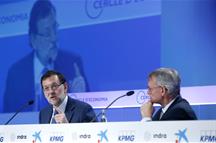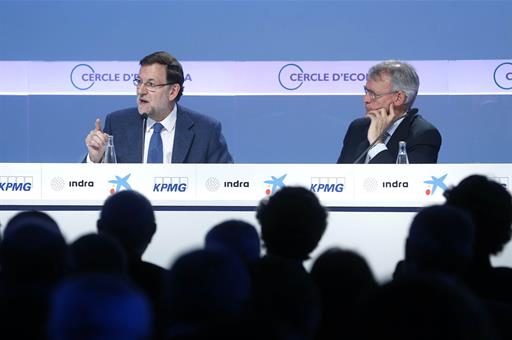Mariano Rajoy announces employment plan and reduction to Corporate Income Tax
President's News - 2014.5.31
30th Meeting of the Círculo de Economía, Sitges (Barcelona)
At the closing ceremony of the 30th Meeting of the Círculo de Economía in Sitges (Barcelona), Mariano Rajoy highlighted the improvement seen in the Spanish economy over the last year since his last speech at this forum but denied the possibility of this leading to a sense of complacency, especially given the current figures on unemployment. "The situation is a lot better, some solid foundations are being laid, but there is still a great deal to be done", he said.
The President of the Government is committed to opening up the Spanish economy to overseas markets and macroeconomic stability as ways "to consolidate the turnaround we have begun". He said that this new cycle is already being reflected in net job creation, as will be demonstrated by the figures on recorded unemployment and National Insurance payments to be released on Tuesday.
Employment and competitiveness
 Pool Moncloa
Pool MoncloaThe challenge now, said Mariano Rajoy, is how "to convert this budding economic recovery into jobs as soon and as quickly as possible because the crisis cannot be considered to be over as long as the currently high levels of unemployment persist".
In this regard, the President of the Government announced that the Council of Ministers will review a new package of measures "before the summer" that will include the modernisation of the Public Employment Services, the reform of the vocational training system and the Youth Guarantee Implementation Plan.
Mariano Rajoy went on to highlight the importance of maintaining the current upturn in competitiveness. With this in mind on Friday the Government of Spain will present a Plan of Measures on Growth, Competitiveness and Efficiency aimed at mobilising a total investment of 6.3 billion euros, of which 3.63 billion euros would come from the public sector.
PIVE Plan and Corporate Income Tax reduction
From among these measures, the President of the Government mentioned a renewal of the PIVE Plan and new stimuli for the acquisition of clean and efficient means of transportation. The plan will also include subsidies for re-industrialisation, loans for SMEs, financing for projects that improve energy efficiency and increased flexibility for creditor agreements under a reform of the Insolvency Act.
Furthermore, Mariano Rajoy recalled that a reform of the tax system will come into effect on 1 January 2015, "the overall result from which will be a lowering of taxation". The President of the Government explained that the Corporate Income Tax rate will be lowered from 30% to 25% and that this reduction will take place in two stages, the first of which will be reflected in next year's taxes. With regard to VAT, he made it clear that "the government has not planned any increases".
Catalonia: dialogue and transparency
 Pool Moncloa
Pool MoncloaAs regards a hypothetical change in the Spanish Constitution, Mariano Rajoy said that such a reform cannot be rejected but cannot begin without "having a clear idea of exactly what it is that people wish to reform and the ultimate goal behind such action".
The President of the Government believes that Spain's most important challenges are the process of European integration - especially in terms of fiscal union, energy union and illegal immigration - to which he also included maintaining the Welfare State.
As regards Catalonia, Mariano Rajoy reiterated his willingness to enter dialogue "within the law and with complete transparency". Furthermore, he recalled that both a large majority of the Spanish Parliament and a ruling handed down from the Constitutional Court have rejected the holding of a referendum.





